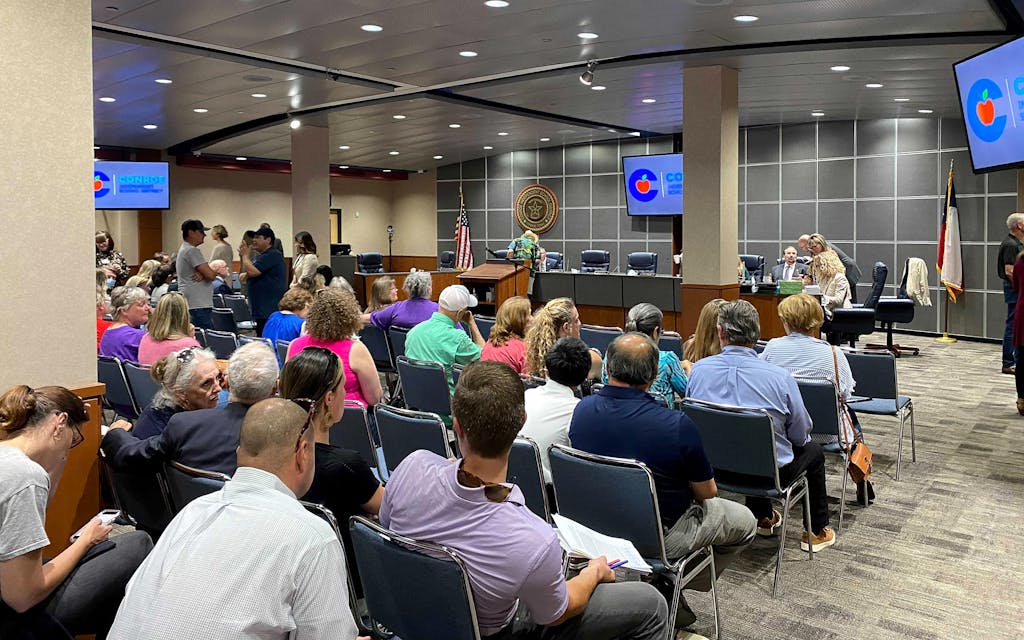Before she even reached the podium to deliver remarks at the Conroe Independent School District board meeting in late July, Ginger Russell began to talk. The small-business owner and mother of two had only three minutes allotted to discuss “critical race theory.” She had spent much of the previous few months attending school board meetings across Montgomery County, north of Houston, decrying the academic framework that examines the ways in which legal, social, and cultural systems can perpetuate racial discrimination.
After a brief detour from her notes to dress down an earlier citizen speaker who had sought public support for queer students, Russell got back on task. First, she called the school board president, Stephen “Skeeter” Hubert, a liar. He had said earlier that night, to raucous applause, that the school district doesn’t teach critical race theory. Then Russell launched into a diatribe slamming Conroe ISD’s diversity, equity, and inclusion policies, which she said were a Marxist ploy to prioritize skin color over merit when hiring educators for the district. Throughout her speech, she failed to mention that nothing the ISD did would affect her children. They have already graduated from high school. What’s more, they haven’t attended a Montgomery County school for more than a decade, as Russell homeschooled them during that period.
Russell was not alone in her crusade that night. Conroe ISD is the tenth-largest school district in the state, with more than 65,000 students. Roughly a hundred parents and other community members, about three times the normal turnout, packed the board meeting. Though the official agenda included examination of standardized test scores, COVID precautions, and the supply of toner and inkjet cartridges, Russell and a handful of other activists quickly turned the meeting into a referendum on critical race theory. During the public comment period, Jon Bouché, who ran a competitive but losing campaign to chair the county GOP, called for the ISD to “defy the woke mob.” Another father called for it to “root out” teachers promoting critical race theory. A young pastor cited the Bible to condemn the “nonsense baloney” of critical race theory and to forbid the board members from having educators teach it to his kids.
Critical race theory has been around since the seventies, but burst into the vernacular when Donald Trump issued an executive order last fall censuring discussion of topics related to race in federal diversity seminars provided by contractors. Then, this spring, the Texas Legislature passed a bill, authored by Steve Toth, who represents a state House district that includes Conroe ISD, targeting what he identifies as critical race theory (though the bill doesn’t use the term). The Texas law dictates that teachers must discuss current events in the classroom from both sides of each issue (if they choose to discuss them at all). It also prohibits educators from teaching material that might prompt students’ “discomfort, guilt, and anguish.”

In this way and others, a debate supposedly aimed at the esoteric academic framework of critical race theory has expanded to cover virtually any discussion of race in the classroom. The law bars teachers from connecting slavery to “anything other than deviations from, betrayals of, or failures to live up to, the authentic founding principles of the United States.” Some proponents of the new state law also believe that lessons on Texas independence should minimize the role slavery played in motivating slave-owning Texian leaders to break from Mexico—a motivation clearly discussed in the letters of some of those Texian leaders.
Critical race theory has divided the state along partisan lines: in June, a survey by the University of Texas and the Texas Tribune found that 44 percent of Texans, and 69 percent of Texas Republicans, support limiting the use of teaching materials that emphasize the history of racism in the U.S., while 75 percent of Democrats oppose such measures.
Experts are uncertain how exactly curricula will be changed in response to the bill. But their consensus is that the legislation addresses a bogeyman. “Texas teachers do not teach CRT,” said George Rislov, the former managing director of the Curriculum Division of the Texas Education Agency. He noted that critical race theory is nowhere to be found in state-mandated curriculum standards, known as Texas Essential Knowledge and Skills (TEKS), whose objectives regarding racism essentially end with discussion of the Voting Rights Act’s passage in 1965. Nonetheless, school board rooms around the state, as in Conroe ISD, have turned into political colosseums.
In Montgomery County, the most solidly Republican of Texas’s eleven biggest counties, the debate over critical race theory has been waged with great ferocity, even though many teachers, parents, and administrators aren’t very clear on what exactly critical race theory is. When asked, Hubert, the board president, couldn’t define what it is. Yet he was certain that Conroe ISD doesn’t teach it. Russell struggled for a definition when we spoke on the phone the afternoon before the board meeting. “I define critical race theory as being racist and very divisive between the races.” When pressed for specifics of what it is, she replied that “it’s detrimental to the Black race” and teaching it to children “create[s] in their little minds that they’re little victims.”
Russell, like many vocal critics, seems to conflate critical race theory with other initiatives schools have recently launched, including diversity, equity, and inclusion programs, and social and emotional learning. “It’s just a rally call,” said Datren Williams, the sole Black member of the Conroe ISD school board. He believes that outrage related to critical race theory is irrelevant to the district’s work and its curriculum and has been driven by fear of a little-understood and mischaracterized practice.
The furor is having real consequences for teachers in the county as school starts up again. Should educators want to discuss current events or “currently controversial issues of public policy or social affairs,” the law requires that they “strive to explore the topic from diverse and contending perspectives without giving deference to any one perspective.” If they don’t, local boards would determine recourse, as there’s no sanction or authority for sanction in the state law, according to Rislov. Emily Winslow, an English teacher at Magnolia High School in Magnolia ISD—a Montgomery County district southwest of Conroe—thinks lawmakers have “weaponized” critical race theory to stifle conversations about race. She says she won’t change how she teaches because of the new law, but she believes others might.
Indeed, one social studies teacher in Magnolia ISD, who requested anonymity out of fear of retaliation from the school board and parents, told me she is trying to tailor her Advanced Placement curriculum to avoid controversy. As she prepares for the school year, she has labeled assignments with explicit and repeated disclaimers that the material is a part of the College Board curriculum, and has communicated the same message to the school administration. The teacher said the law will hinder a thorough civics education, as once-common activities such as letter-writing assignments, in which students would write to local political leaders, will now be prohibited under Toth’s bill. “I just don’t understand why they don’t want students involved in the legislative process,” she said.
Robert Hawkins, who just retired after eighteen years in Magnolia ISD, part of which he spent as a fifth grade U.S. history teacher, and who was the president of the local teachers’ association, worried most for new teachers who haven’t grasped how the system operates. He said Texas teachers have long had to master “the dance,” balancing the preferences of scrutinizing parents with the desire to feed students’ curiosities. “We are paid by the taxpayers to deliver the content that’s been approved by the Legislature,” he said. “As much as we’d like to think that we are there first and foremost for the children, sadly, first and foremost we are employees.”
Back at the school board meeting in Conroe, parents didn’t seem to care for teachers’ concerns. “They need to get back to a textbook and a pen and a paper with a classical education,” Russell said to me on the phone before the meeting. It was a sentiment repeated again and again by those who showed up to rail against critical race theory. One parent even garnered applause after suggesting the ISD install security cameras with audio in classrooms to monitor whether educators were sticking to the script.
After Russell spoke and the citizen participation period ended, I approached Williams, the Black board member and its past president. I asked what he thought about the controversy over critical race theory and the outsized claim it is commanding over the attention of the board and the teachers. COVID mitigation was supposed to have been one of the bigger conversations that night (and indeed, it became a central concern on Monday when the ISD recorded the highest number of COVID cases in a single day in any Texas school district since the pandemic began). Students’ test scores in the district, while above state averages, have declined since 2019. Williams told me to take a look around me. The room was almost entirely full of parents who were white, in a district where 37 percent of students are Hispanic and 9 percent are Black. It didn’t so much matter whether they were arguing against a bogeyman; they were on the front lines of a culture war, and they were winning.
- More About:
- Politics & Policy
- Conroe






